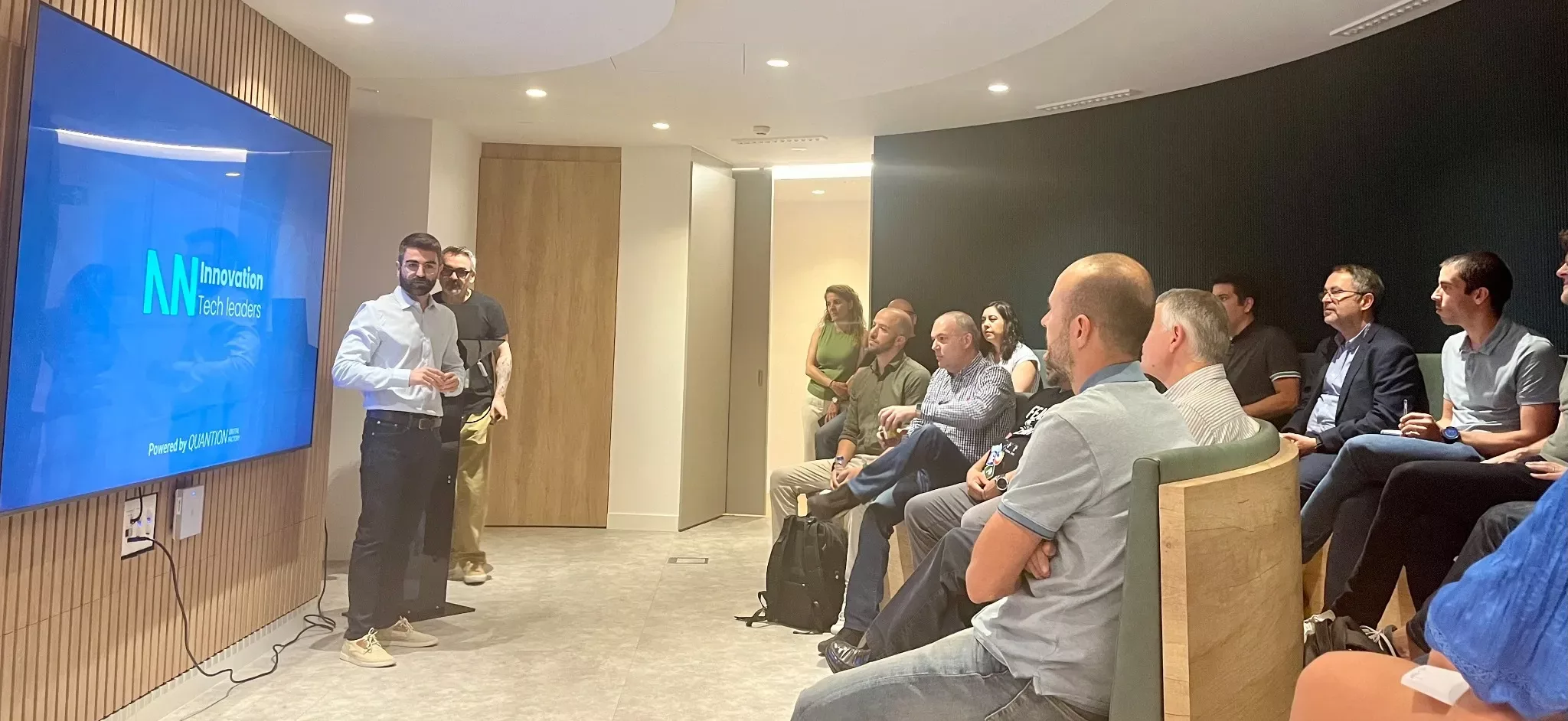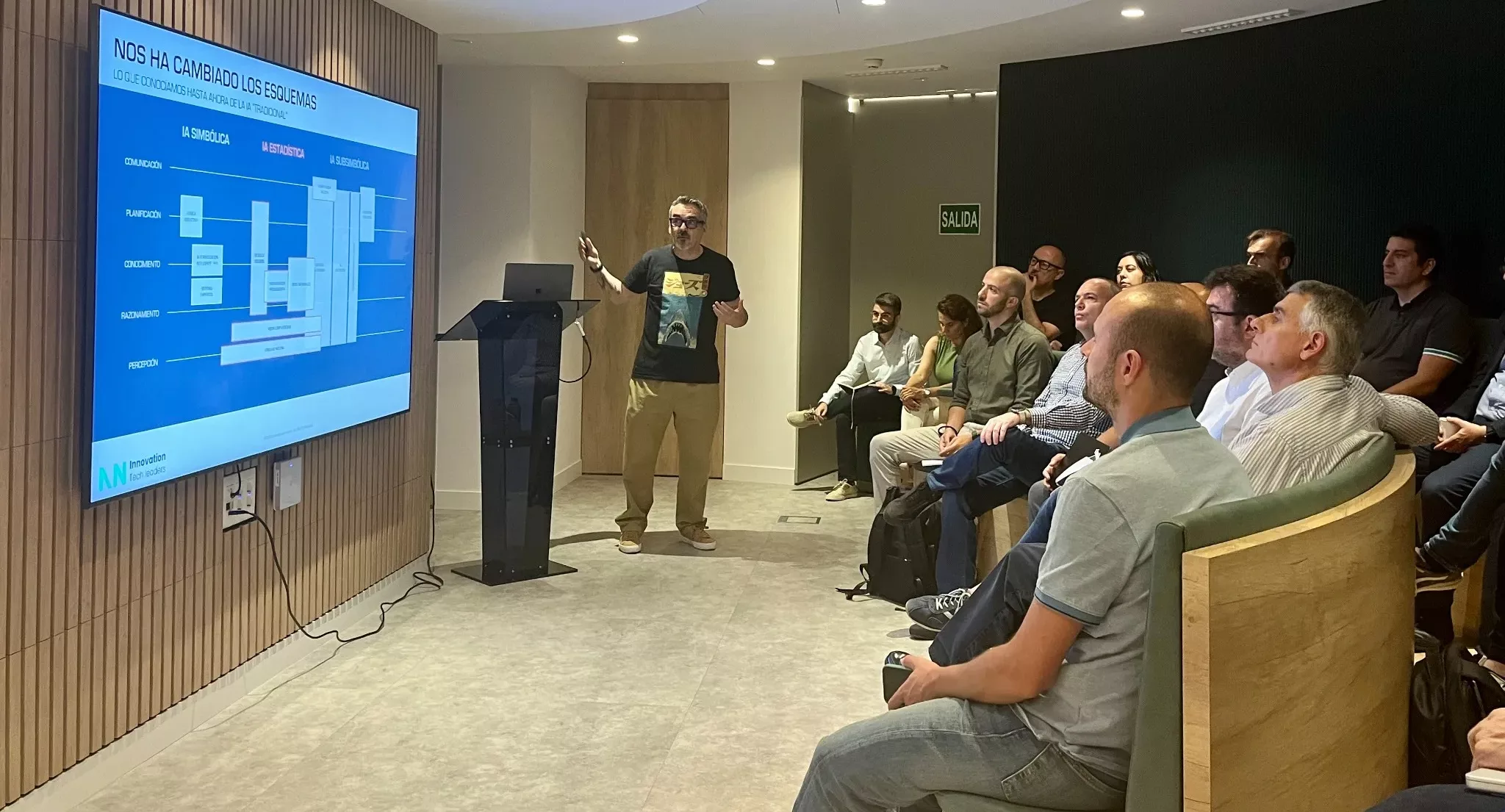On June 28th, a community event titled “Business Transformation with GenAI: Use Cases and Key Insights for Adoption” took place, featuring experts Rod Menchaca Betancur, Global Director of Digital Skin at ISDIN, and Dani Cardelús, AI & Data Expert at Quantion. They shared their insights on how Generative AI is transforming the business landscape and how it can practically generate more value for companies.
The event saw participation from technology, transformation, and innovation leaders from top companies. Factor Energia, Fundación LaCaixa, Comsa, Laboratorios Gebro Pharma, Gallina Blanca, Grifols, MediaMarkt, VidaCaixa, Buff, Beyond Hospitality, and Grupo Consorcio actively contributed valuable perspectives in a highly enriching final debate.

Generative AI: A Key Factor in Changing Market Dynamics
Generative AI has the power to radically alter market dynamics. Enabling companies to stay ahead of trends and offer personalized and precise solutions to their customers. This was validated throughout the event. Dani Cardelús began with a theoretical and technical introduction to AI. He started explaining concepts like the “digital brain,” which allows for more effective knowledge management within organizations by centralizing information and improving data-driven decision-making. He also illustrated how AI can streamline content creation, with examples such as automatic voiceovers for advertising videos and the creation of complex code. Demonstrating the potential of this technology to optimize both creative and technical processes.
Cardelús stressed the crucial role of a methodical and structured approach for successful Business Transformation with GenAI. He emphasized the necessity of rigorous data governance to maintain information integrity and privacy. Additionally, he underlined the importance of continuous training to ensure that teams remain proficient with the latest AI tools and practices. This approach not only secures data but also empowers teams to effectively leverage AI technologies for transformative business outcomes.

In the second part of the event, Rod Menchaca shared real-world experiences from major projects; showcasing how ISDIN applies Generative AI to create value across different areas of the company. Menchaca discussed key learnings to consider when implementing an AI strategy. Stressing the need for responsible policies and robust ethical frameworks to avoid risks and maximize the benefits of the technology.
For further reading on the benefits of Generative AI in business, check out the article Benefits of Generative AI for Business: Innovation and Trust on the Quantion blog.
Innovations with Generative AI by Rod Menchaca
Development of a Surgical GPS to Improve Surgeries
Rod presented a revolutionary project developed in collaboration with Google X: a surgical GPS. This system is designed to predict ideal movements during complex surgeries significantly improving precision and reducing surgical risks. The surgical GPS analyzes thousands of surgical procedures to suggest precise movements to surgeons, reducing the likelihood of errors and improving patient outcomes. By 2019, this project had achieved nearly 100% accuracy in identifying surgical movements, not only enhancing surgical effectiveness but also providing an educational platform for surgeons to learn from each procedure through an online portal.
Menchaca reflected on the tension between strict efficiency and the need for innovation, citing a surgeon in Barcelona who significantly reduced patient recovery times by deviating from standard procedures. However, he warned that a strictly efficient AI system might consider such deviations as errors. This highlights the importance of balancing adherence to standards with the ability to innovate and adapt to unique circumstances.
Cultivation of Neurons Outside the Human Brain to Improve Treatment of Diseases
Another innovative project by Menchaca, developed in collaboration with Cortical Labs, involves cultivating neurons outside the human brain to interact with chips, creating a hybrid biochip system. This advancement has enormous potential in treating neurodegenerative diseases like Alzheimer’s and Parkinson’s. By cultivating neurons and allowing them to interact with chips, researchers can observe neuronal reactions to various treatments in a controlled environment, accelerating the research and development of new therapies. This method allows for the replication of neurodegenerative diseases outside the human body, facilitating drug and treatment testing without direct experimentation on patients.
Rod emphasized the importance of this technology in advancing medical knowledge. He noted that while this system accelerates the development of treatments, it also raises fundamental questions about AI’s ability to replicate and understand complex biological processes. He stressed the need to balance technological innovation with an ethical understanding of its implications, highlighting that while technology can offer rapid solutions, it is crucial to consider its long-term impacts on society and the medical field.

ISDIN’s Vision with AI
Responsible Use of AI
Menchaca highlighted ISDIN’s commitment to the responsible use of AI. He explained that the company has developed a comprehensive responsible AI policy, covering ethical and legal aspects. This policy includes the creation of a Coherence Manager role, dedicated to ensuring that AI-generated results are consistent, fair, and transparent. The policy also sets clear guidelines for data protection, privacy, and accountability, ensuring that AI is used in a way that respects the rights and dignity of all parties involved.
Application Areas in the Organization
he Global Director of Digital Skin at ISDIN also described key areas where they have implemented AI, focusing on innovation and creativity for business transformation with GenAI:
- Innovation and Creativity: Creating digital twins to simulate and optimize production processes in real-time. AI is also used to better optimize resources, create content faster, and optimize advertising campaigns.
- Consumer Relationships and Data: AI is used to learn from consumer relationships and group subsidiaries, identifying important signals from collected data. This data is analyzed and turned into useful information for the company, improving personalization and market response.
- Improving Efficiencies and Detecting Fraud: Optimizing their return systems, significantly speeding up logistical processes. Additionally, AI is used for more effective fraud detection than traditional methods, protecting both the company and its customers.
Coherence Manager and Cultural Change
Rod emphasized the crucial role of the Coherence Manager at ISDIN. This new role in Spain is fundamental in overseeing the coherence and ethics of AI-generated results, ensuring alignment with corporate values. He also highlighted that adopting advanced technologies like AI requires a mindset change across the organization, from top management to operational staff. This change involves greater openness to innovation, a willingness to learn new skills, and the ability to quickly adapt to new tools and methods of working.
Menchaca reflected on the impact of AI on corporate transformation, noting that these innovations not only improve the efficiency and effectiveness of internal processes but also change organizational culture. He stressed that successful implementation of these technologies largely depends on the company’s ability to integrate AI into its corporate culture in a way that fosters collaboration, creativity, and a commitment to continuous improvement.
Challenges and Opportunities
During the final debate, attendees discussed the challenges of scaling AI solutions and the hidden costs of implementation. The speakers emphasized the need for a clear strategy to integrate these technologies into any type of business. They noted that while initial implementation can be costly, the long-term benefits in terms of efficiency and innovation capability can justify the investment.
The discussion also addressed companies’ concerns about their real ability to efficiently adopt AI. The experts agreed that while Generative AI presents challenges, it also offers significant opportunities for companies willing to invest in its development and adoption. They recommended that companies with more limited budgets start with pilot projects and gradually scale adoption, ensuring that each step aligns with their specific capabilities and needs.

The event was a great opportunity to understand the transformative potential of Generative AI in the business environment, showcasing business transformation with GenAI. Attendees gained insights and best practices on how to implement these technologies effectively and ethically, preparing for the digital future. The experts emphasized that successful AI adoption requires not only investment in technology but also a commitment to continuous training and ethical and social management.
For more information on upcoming events and interviews, follow the updates on the Innovation Tech Leaders LinkedIn profile and their blog. (Bear in mind that the communications made by the community are in Spanish.)




